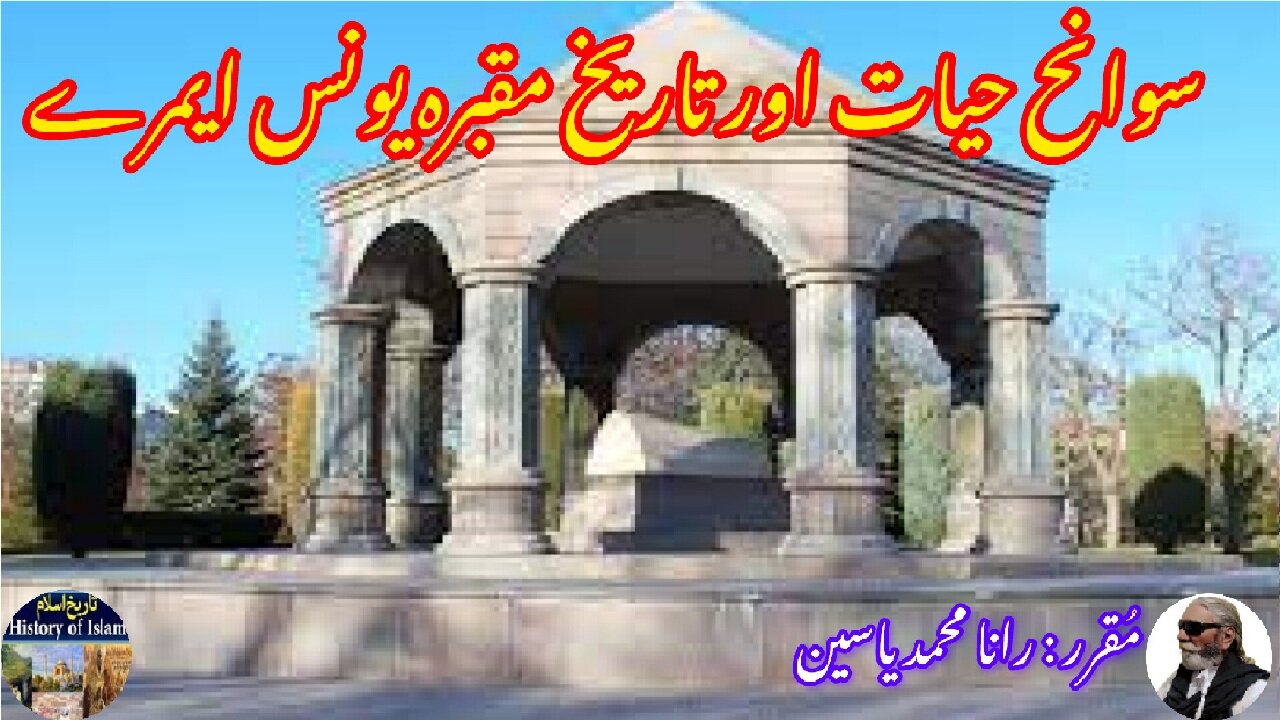Premium Only Content

Yunus Emre and the history of his shrine یونس ایمرے کی سوانح عمری اور ان کے مزار کی تاریخ
@islamichistory813 #sufisaint #cultural #heritage #biography #islamic #mysticism #islamic #philosophy #shrine #historical #figures
Biography of Yunus Emre and the history of his shrine
Dekhti Aankhooon aur sountay kaanoon ko Asslamoalaikum, sisters, brothers friends and elders, in informative series videos of Islamic ascolars, sufisaints, cultural heritages, islamic philosophys, islamic mysticisms and historical figures. today we are describing biography of Yunus Emre and the history of his shrine.
Yunus Emre, also known as Dervish, is one of the most beloved and influential figures in Turkish literature and spiritual history. Born around **1238** in the Anatolian region of present-day Turkey, Yunus Emre lived during a turbulent period marked by the fragmentation of the Seljuk Sultanate and the gradual rise of the Ottoman Empire. Although details about his exact birthplace remain somewhat uncertain, many historians and scholars suggest that he was born in the area of **Sar?köy or Karaman**, located in the southwestern part of Anatolia, where Turkish culture and Islamic mysticism flourished. Yunus Emre’s life spanned approximately 82 years, with his death occurring around **1320**, likely in the region of Anatolia as well, which remained the center of his spiritual and poetic activities. His tomb is traditionally believed to be located in the village of **Sar?köy, near Eski?ehir**, Turkey, though there are other claims to his burial site, reflecting the widespread reverence he commands across Turkish lands.
Yunus Emre’s biography is wrapped in both historical facts and hagiographic legends, which have combined over centuries to create a rich tapestry of spiritual and cultural significance. Born into humble circumstances, Yunus Emre’s early life was shaped by the oral traditions of folk poetry, Sufi teachings, and the dynamic spiritual environment of Anatolia, where many wandering dervishes and Sufi orders like the Mevlevis and Bektashis were active. It is believed that Yunus Emre received his early spiritual education under the guidance of prominent Sufi masters of the time, possibly including Tapduk Emre, who is sometimes credited as his spiritual mentor. This influence profoundly shaped Yunus Emre’s worldview, emphasizing love, humanism, and the inner path to God over rigid dogmatism.
Throughout his life, Yunus Emre composed a vast body of poetry in the Turkish vernacular, rather than the more traditional Arabic or Persian, making his work accessible to the common people and endearing him to generations of Turks. His poems, written in simple yet deeply expressive language, focus on themes of divine love, unity of being, humility, and the quest for spiritual enlightenment. The poetry of Yunus Emre transcends religious boundaries, resonating with universal messages of tolerance, peace, and compassion. This powerful approach earned him a legendary status not only among Sufis but also across Turkish society, where his verses became part of the cultural and spiritual fabric.
Yunus Emre’s influence on Turkish culture is monumental. He is often considered the father of Turkish folk poetry and a foundational figure in Turkish literature, inspiring countless poets, musicians, and artists throughout history. His poetic style bridged the gap between the elite classical literature and the oral traditions of the masses, thus creating a uniquely Turkish literary voice. The themes of his poetry align closely with the mystical Sufi concept of tawhid (the unity of God) and the belief in the divine presence within every human being. His verses encouraged self-reflection, spiritual awakening, and love for all creation, which remain core principles in Turkish Sufi practice today.
In recognition of his enduring impact, the **UNESCO General Conference unanimously declared 1991 as the International Yunus Emre Year**, marking the 750th anniversary of his birth. This declaration underscored Yunus Emre’s importance not only as a national cultural icon but also as a universal symbol of spiritual wisdom and humanism. The celebrations featured various cultural events, symposiums, and publications dedicated to exploring his life, works, and continuing legacy in the modern world.
Yunus Emre’s shrine, known as the **Yunus Emre Türbesi**, is located in Sar?köy village, near the city of Eski?ehir in Turkey. This mausoleum is a revered site for pilgrims and admirers who visit to pay homage to the great poet-saint. The shrine was constructed centuries after his death, initially as a modest tomb, but over time it has been expanded and maintained by successive generations of devotees and local authorities who recognized the significance of preserving his memory. The shrine complex today includes a museum dedicated to his life and works, alongside spaces for meditation and communal gatherings, reflecting the ongoing spiritual vitality of his legacy.
The shrine’s construction and upkeep have been a community effort, with local rulers and Turkish cultural organizations playing pivotal roles in maintaining the site. During the Ottoman period and the Turkish Republic era, considerable efforts were made to restore and enhance the shrine to ensure it could accommodate the many visitors drawn by Yunus Emre’s enduring reputation. The architecture of the shrine is modest but dignified, blending traditional Anatolian styles with elements that evoke the spiritual simplicity and humility Yunus Emre advocated throughout his life.
Yunus Emre’s legacy also extends far beyond Turkey. His poems have been translated into many languages, and his teachings continue to influence contemporary thinkers, poets, and spiritual seekers worldwide. The universal themes of love, tolerance, and unity that permeate his work resonate deeply in the modern era, where intercultural dialogue and spiritual understanding are increasingly valued.
In conclusion, Yunus Emre stands as a monumental figure in the spiritual and literary history of Turkey and the broader Islamic world. Born in **1238** in Anatolia, he devoted his life to the pursuit of divine love and human connection, producing poetry that remains alive in the hearts of millions. Passing away around **1320**, he was laid to rest in **Sar?köy**, where his shrine, built and maintained by generations of followers, continues to be a beacon of inspiration. The celebration of his 750th birth anniversary by UNESCO affirms his status as not only a national treasure of Turkey but also a universal spiritual guide whose message transcends time and geography. His life and works continue to shine as a testament to the power of poetry and mysticism to transform hearts and societies.
With this, we ask for your permission until tomorrow and pray to Allah Almighty to grant us the ability to act on the Quran and Hadith, Amen
Allah Hafiz
======================
-
 11:13
11:13
ISLAMIC HISTORY
16 hours agoIslamic History Episode 233 Death and Caliphate of Al-Mu'tasim अल-मुत्तसिम معتصم کی وفات اور خلافت
3 -
 26:33
26:33
DeVory Darkins
1 day ago $32.48 earnedRep Omar EMBARRASSES herself in a painful way as Newsom PANICS over Kamala confrontation
67.5K278 -
 3:28:14
3:28:14
Badlands Media
22 hours agoThe Narrative Ep. 39: The Sovereign Mind
89.8K29 -
 2:17:35
2:17:35
TheSaltyCracker
7 hours agoThe Charlie Kirk Effect ReeEEStream 9-21-25
106K275 -
 2:03:07
2:03:07
vivafrei
6 hours agoEp. 283: Charlie Kirk Memorial and other Stuff in the Law World
204K141 -
 9:13:12
9:13:12
The Charlie Kirk Show
17 hours agoLIVE NOW: Building A Legacy, Remembering Charlie Kirk
2.15M898 -
 1:55:20
1:55:20
The White House
10 hours agoPresident Trump Participates in the Memorial Service for Charlie Kirk
94.3K89 -
 1:02:41
1:02:41
Sarah Westall
8 hours agoDomestic Terror Operation: Death Threats, Smear Campaigns, Gang Stalking w/ Journalist Sarah Fields
48.1K7 -
 1:51:40
1:51:40
Nerdrotic
9 hours ago $14.74 earnedGobekli Tepe Discovery and "Reconstruction" | Forbidden Frontier #118
77.7K8 -
 29:07
29:07
Tactical Advisor
9 hours agoATF Changes Ruling on SBR & Tacpack unboxing | Vault Room Live Stream 039
88.1K16